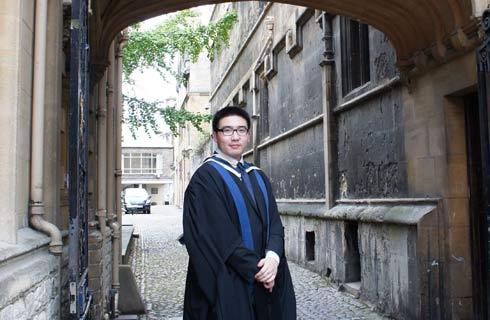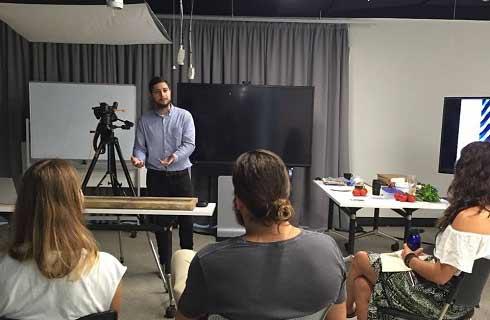国际学生入学条件
A level offer – A*AA including Mathematics and one subject that carries a practical endorsement (Biology, Chemistry, Geology or Physics).BTEC Level 3 National Extended Diploma/OCR Cambridge Technical Extended Diploma – D*DD and Mathematics at grade A at A level (or equivalent) are required.IB Diploma score – 38 with 666 in higher level subjects, including Mathematics and one STEM subject (Biology, Chemistry or Physics).
展开
IDP—雅思考试联合主办方

雅思考试总分
6.5
了解更多
雅思考试指南
- 雅思总分:6.5
- 托福网考总分:80
- 托福笔试总分:
- 其他语言考试:Pearson Academic PTE - 62 (with no less than 59 in each Communicative Skill)
Cambridge C2 Proficiency or C1 Advanced - 176 with a minimum of 169 per component
CRICOS代码: H314
申请截止日期: 请与IDP顾问联系以获取详细信息。
课程简介
Enter the exciting world of engineering, as you develop the skills to plan, design and analyse engineering projects. Become a specialist in the field that fascinates you, and respond to new and changing technologies.,This degree designed to offer you the knowledge and skills necessary to join engineering teams on graduation. It is complementary to the four-year Durham MEng, and transfer is possible between the courses up to the end of the second year. In the first two years, the BEng covers the same broad base of engineering education as the MEng degree. You then specialise in Mechanical Engineering in your third year. The course structure offers a huge amount of flexibility – you could join us on a electronic engineering pathway but decide to pursue mechanical engineering at the end of your second year. We believe in empowering our students to make informed decisions. The BEng prepares you for an exciting career in modern engineering, with the flexibility to respond to changing technologies. There may be the opportunity to study at an overseas institution, or spend time in industry as an additional year between Years 2 and 3. A course highlight is the Engineering Project in the final year where you will work one-to-one with an academic expert on a technical engineering challenge.You will study four modules in engineering, one in mathematics and one optional module. In your engineering modules, you will examine 3D Computer-Aided Design (CAD) software and implement engineering algorithms into computer code. You will also take part in a group design activity where you have to design, build and test a device to solve a specific engineering challenge. Recent examples include miniature hydroelectric generators and chain-climbing robots.Course structureYear 1 modulesCore modules:Solid Mechanics and Structures 1 gives you a working knowledge of solid mechanics, structures and structural analysis, in a wider engineering context.Electronic and Electrical Systems 1 offers you knowledge of electrical and electronic circuit theory, components, electromagnetism and hardware interfacing.Thermodynamics and Fluid Mechanics 1 provides you with knowledge of thermodynamics and fluid mechanics including dimensional analysis, fluid statics and fluid dynamics.Engineering Practice 1 provides you with practical engineering skills relevant to multiple engineering disciplines. It shows how the material covered in other engineering modules fits together in the wider engineering context, and will also introduce you to engineering ethics and professional issues.Mathematics for Engineers and Scientists gives you all the maths skills and techniques needed for studying Engineering and other sciences.Optional modules:In recent years, optional modules have included: Introduction to ProgrammingComputational Thinking.Year 2 modulesCore modules:Engineering Mathematics 2 provides you with a knowledge of probability and statistics and advanced mathematical methods for modelling engineering problems.Thermodynamics and Fluid Mechanics 2 gives you further working knowledge of thermodynamics and fluid mechanics.Solid Mechanics and Structures 2 builds your knowledge of the mechanics of dynamics and vibration, stress analysis of structures and sections, trusses and frames, and the mechanics of soils. It also provides an introduction to finite element methods.Electrical Engineering 2 provides you with a knowledge of mathematical methods for modelling engineering problems and computing.Electronics 2 gives you a knowledge of electronics and computing in terms of circuits, digital electronics and microprocessor design.Engineering Design 2 You will learn about various aspects of the design process including the principles of design and project management. You will undertake a major design project with guidance from an academic supervisor and an external (industrial) engineer.
展开







 预科
预科 奖学金
奖学金 实习机会
实习机会 在校学习
在校学习 跨境学习
跨境学习 校园授课-线上开始
校园授课-线上开始 在线/远程学习
在线/远程学习














 希拉巴克斯特培训中心(私立)
希拉巴克斯特培训中心(私立)

 霍姆斯格兰职业技术学院
霍姆斯格兰职业技术学院

 斯威本科技大学
斯威本科技大学

 悉尼大学
悉尼大学

 伊迪斯科文大学
伊迪斯科文大学

 霍姆斯格兰职业技术学院
霍姆斯格兰职业技术学院




















 英国
英国




